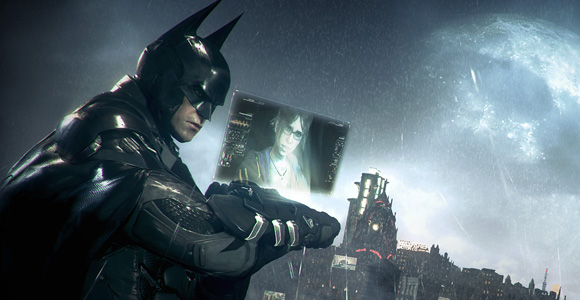
Batman: Arkham Knight did something that I never thought would happen – it made me enjoy a Batman story. I’ve always been more of a Marvel fan than DC, but even then, my interest in superheroes is pretty limited. I’ve been obsessed with Spider-Man from a young age, but Captain America? Iron Man? The Hulk? I couldn’t care less.
I cared about DC superheroes (and villains – I know everyone always says DC’s appeal is the villains, but I didn’t like those guys, either) even more than I didn’t care about Marvel’s. I always thought they were boring, especially Batman. He never appealed to me. He didn’t have any real superpowers, just money. He wasn’t actually part bat, he just dressed up like one. What was the point? Arkham Knight changed that. Kind of.
Batman: Arkham Knight, developed by Rocksteady Studios and published by Warner Bros. Interactive Entertainment in 2015, is an intriguing video game, even for someone who’s not a Batman fan. There’s just one problem – Batman. The game is set nine months after Batman: Arkham City, which came out in 2011. The story follows Batman as he tries to thwart Scarecrow, who has developed a toxin that will affect all Gotham citizens. To make Batman’s job even harder, Scarecrow has partnered with the mysterious Arkham Knight, and good old Bruce Wayne needs to figure out who Arkham Knight is and how to take him down.
I’m not sure why, but for some reason, when I was scrolling through Game Pass a few weeks ago, Batman: Arkham Knight caught my eye and I downloaded it, knowing I didn’t like Batman. I was pleasantly surprised. The opening cutscene astounded me, even five years later. It was visually stunning with tons of detail, making Gotham look gritty and depressing, just like it’s supposed to, and the story setup made me feel like I was watching a movie instead of playing the opening to a video game. The acting was good, the premise was interesting, and Scarecrow was so intriguing that I couldn’t help but be curious about how his evil scheme would play out for Gotham City. That said…Batman was still uninteresting.
Silent protagonists aren’t uncommon in video games, and I’m fine with that. The Legend of Zelda is, of course, one of my favorite series of all time, and Link never says anything. Instead, players learn to relate to him through his facial expressions and dialogue from other characters, which builds relationships and emotional connections for the player as well.
So, it’s not that Batman doesn’t talk that often, it’s that when he does, he never has anything important to say. Now, I know he feels the need to remain mysterious and cool (and keep his true identity hidden from people), but as the player, some internal monologue other than his Joker hallucinations would be so helpful. Unlike The Legend of Zelda, the player is never given the opportunity to build that emotional connection through his relationships with other characters because Batman is so cold and detached that those relationships feel almost nonexistent. His relationships with other characters feel more like polite interactions with coworkers than real friendships.
Because of that, after hours upon hours of playtime, I had absolutely no attachment to Batman as a character. I felt more attached to the villains, like Scarecrow and the fake Joker, just because they talked. I knew their personality. I could understand their motivations. I could sympathize with them, even if I obviously don’t agree with spreading toxins to cause chaos across the nation.

Even the other protagonists, like Barbara Gordon as Oracle and Tim Drake as Robin, were more captivating characters with clearer motivations than Batman. Players get to see Robin’s motivations very early on when he’s concerned about Oracle’s well-being, and it’s the same with Oracle when she feels guilty about lying to her father. Robin wants to help Gotham because he views Batman as a father figure that he cannot disappoint, and he has a romantic relationship with Oracle and feels responsible for keeping her safe. Oracle has a complicated relationship with her father because she loves him but also feels a desire to help Gotham, which he wouldn’t allow her to do if he knew about it because he’s so protective, so she has to lie to him and partner with Batman behind his back.
Batman, on the other hand, has no emotions regarding any of this. Sure, the Joker hallucinations are very clearly supposed to serve as Batman’s internal monologue, but are they actually effective? Joker’s dialogue was supposed to represent Batman’s feelings, like his guilt over Barbara’s kidnapping. Instead, it came off as a tense situation between Batman and a lifelike Joker, diving into their history and relationship more than Batman’s actual sentiments regarding his actions and supposed friends.
Often, it feels like the game doesn’t really want the player to care about Batman or is, at the very least, indifferent about it. Maybe it’s because the developers expected players to already have an attachment to Bruce Wayne because of prior experiences with the franchise, but other than the Joker hallucinations (which, as I said earlier, made me more interested in Joker than Batman), there’s really no effort to display any kind of emotional connection to Batman in Arkham Knight.
While I did have a much better time with Batman: Arkham Knight than I was expecting, I cared about all the characters except the one I was supposed to care about. Instead of playing the game as Bruce Wayne, I wanted to be Robin or even watch the game through the lens of Oracle. Both characters were far more interesting, with more personality in their pinky finger than Batman had in the entire game. Because of that, Batman: Arkham Knight is a strange game. It’s an incredible story with incredible lore and incredible characters…you just don’t get to experience it all because you’re stuck controlling the Bat.
Batman: Arkham Knight is available now on Microsoft Game Pass.






